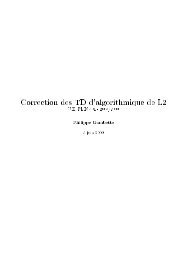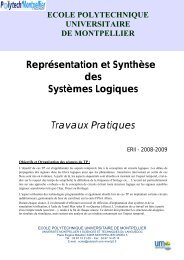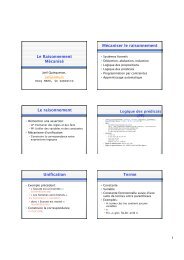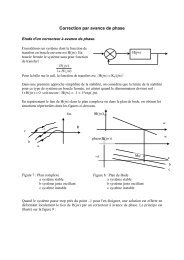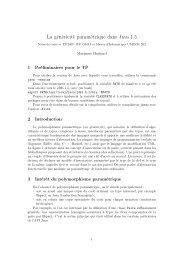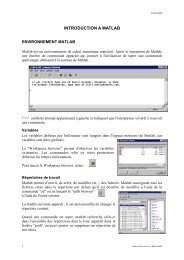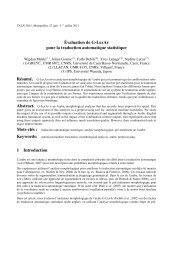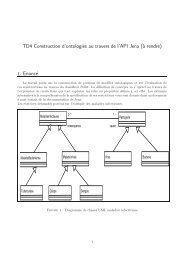Evaluating User Experience in Games: Concepts and Methods - Lirmm
Evaluating User Experience in Games: Concepts and Methods - Lirmm
Evaluating User Experience in Games: Concepts and Methods - Lirmm
You also want an ePaper? Increase the reach of your titles
YUMPU automatically turns print PDFs into web optimized ePapers that Google loves.
Chapter 13<br />
Us<strong>in</strong>g Heuristics to Evaluate the Overall <strong>User</strong><br />
<strong>Experience</strong> of Video <strong>Games</strong> <strong>and</strong> Advanced<br />
Interaction <strong>Games</strong><br />
Christ<strong>in</strong>a Koeffel, Wolfgang Hochleitner, Jakob Leitner, Michael Haller,<br />
Arjan Geven, <strong>and</strong> Manfred Tscheligi<br />
Abstract This chapter describes an approach to evaluat<strong>in</strong>g user experience <strong>in</strong> video<br />
games <strong>and</strong> advanced <strong>in</strong>teraction games (tabletop games) by us<strong>in</strong>g heuristics. We<br />
provide a short overview of computer games with a focus on advanced <strong>in</strong>teraction<br />
games <strong>and</strong> expla<strong>in</strong> the concept of user-centred design for games. Furthermore, we<br />
describe the history of heuristics for video games <strong>and</strong> the role of user experience<br />
of games <strong>in</strong> general. We propose a framework consist<strong>in</strong>g of three sets of heuristics<br />
(game play/game story, virtual <strong>in</strong>terface <strong>and</strong> tabletop specific) to detect the most<br />
critical issues <strong>in</strong> video games as well as advanced <strong>in</strong>teraction games. To assess its<br />
applicability, we compare the results of expert evaluations of five current games with<br />
the user experience-based rat<strong>in</strong>gs of various game review sites. In the conclusion,<br />
we provide an outlook on possible extensions of our approach.<br />
13.1 Introduction<br />
The computer games <strong>in</strong>dustry has remarkably <strong>in</strong>creased <strong>in</strong> importance over the last<br />
years (ESA 2008). The number of units sold climbs up steadily, <strong>and</strong> video games<br />
have changed from be<strong>in</strong>g a product for a small m<strong>in</strong>ority to a widely used <strong>and</strong><br />
accepted medium. The exp<strong>and</strong><strong>in</strong>g game market also opens the door for a series<br />
of research-related activities. Especially the term user experience (UX) has become<br />
<strong>in</strong>creas<strong>in</strong>gly important. Researchers <strong>and</strong> human-computer <strong>in</strong>teraction (HCI) experts<br />
want to f<strong>in</strong>d out how computer gamers experience the game situation (Clarke <strong>and</strong><br />
Duimer<strong>in</strong>g 2006), <strong>and</strong> the <strong>in</strong>dustry is <strong>in</strong>terested <strong>in</strong> f<strong>in</strong>d<strong>in</strong>g ways to measure the user<br />
experience <strong>and</strong> to <strong>in</strong>terpret the collected data (e.g. to acquire new target groups). The<br />
evaluation of the user’s experience <strong>and</strong> the closely connected user-centred development<br />
of video games have been addressed <strong>in</strong> numerous publications (cf. Marsh et al.<br />
C. Koeffel (B)<br />
Center for Usability Research <strong>and</strong> Eng<strong>in</strong>eer<strong>in</strong>g, Vienna, Austria<br />
e-mail: christ<strong>in</strong>a@c-na.net<br />
R. Bernhaupt (ed.), <strong>Evaluat<strong>in</strong>g</strong> <strong>User</strong> <strong>Experience</strong> <strong>in</strong> <strong>Games</strong>, Human-Computer<br />
Interaction Series, DOI 10.1007/978-1-84882-963-3_13,<br />
C○ Spr<strong>in</strong>ger-Verlag London Limited 2010<br />
233




